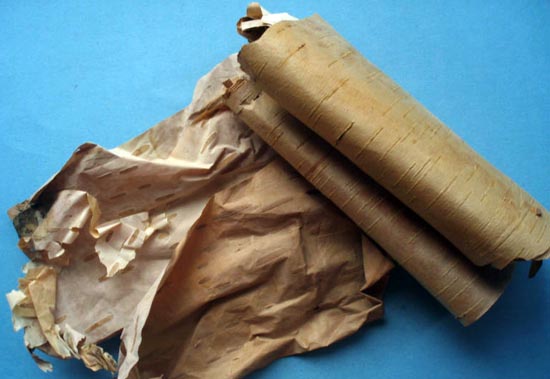Distribution:
Temperate and subarctic areas of Asia, such as: Northeast China, North China, Henan, Shaanxi, Ningxia, Gansu, Qinghai, Sichuan, Yunnan and southeastern Tibet; Russia, Mongolia, North Korea, Japan.
Properties (characteristics):
Bitter, neutral
Channels (meridians) entered:
Lung, stomach, large intestine.
Medical functions:
Betulin can inhibit the synthesis of cholesterol and triglycerides, and can effectively prevent obesity, atherosclerosis and type II diabetes.
Arresting cough, expectorant and anti-asthmatic effects. Intraperitoneal injection of water, methanol, ether and acid ethanol extracts of hua shu pi possesses anti-cough effect in mice.
Actions & Indications:
For clearing damp-heat and detoxification. For acute tonsilitis, Chronic Bronchitis, pneumonia, enteritis, dysentery, Virus Hepatitis, oliguria with yellow urine, Mastitis; topical treatment of burns, and Carbuncle.
Chemical ingredients:
Betulin (β-Amyrin)
Betuloside
Tannin 7%
Oleanolic Acid
Different types of higher fatty acid, about 35%
Phenol
Saponin
Polysaccharide
Protein
Triterpenoids
Total glucoside
Resin
Fat
Daly Dosage:
9 to 15 g, make into powder mix with liquid. Take orally..
External use: appropriate amount.
Samples of formulae:
For treatment of dysentery: calcine hua shu pi into charcoal. Grind into fine powder. Take 3 g each time, twice a day.
For treatment of hot and small amount of urine: use hua shu pi to make into strong decoction. Take orally.
Cautions:
Plants can cause systemic toxicity varying from mild abdominal cramping to serious cardiac complications.


![Diseases, Symptoms, tcm, [tcmwindow.com]](/uploadFile/adImg/2015/11/11/f5cbfcc0-4df5-4646-9b9a-f316651a0199.jpg)





